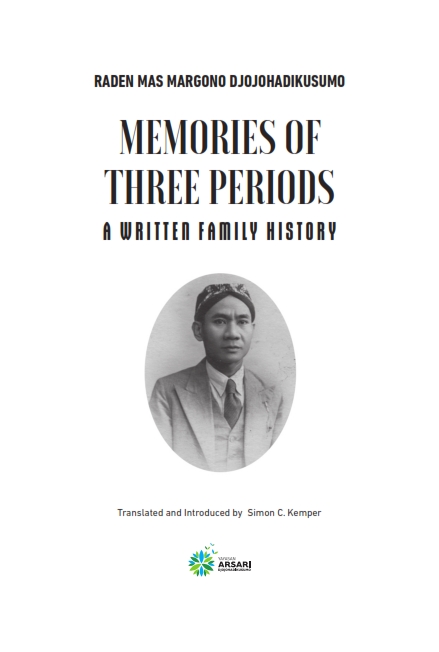
Memories of three periods: a written family history
Author: Margono Djojohadikusumo: translated, Simon C. Kemper Category: Pendidikan Publisher: Yayasan Arsari Djojohadikusumo Published: ISBN: 978-602-92251-0-7Over forty years have passed since my grandfather, Raden Mas Margono Djojohadikusumo died on 25 July 1978, and it is a good sixty years now since he used to walk me to school during our exile years in Singapore (1958-60), Hong Kong (1960-62), and Malaysia (1962-64). In the time hallowed Javanese tradition I called him then and still wish to
refer to him here as ‘Eyang Kakung’ (grandfather; literally: ‘male grandparent’). Come rain and sunshine, without fail, Eyang Kakung Margono would walk me up to the school gates and wave me a cheery goodbye. I would watch him intently as his beloved figure disappeared from view as he rounded the corner (school for me at that young age was always a torture). But I still retain many vivid memories of him. In outward appearance, he was through and through a Javanese gentleman. Indeed, I remember him often dressed in Javanese head-dress (blangkon) and clad in the formal attire of the Susuhunan’s court (Surakarta), namely, the beskap, a tight-fitting short jacket with high-closed collar, long sleeves
and two wide flaps folded over the breast and buttoned up at the shoulders. He also loved watching wayang (Javanese shadow-puppet plays) and would attend such performances regularly at the Istana Negara in the early New Order period (1966-98) when he was back in Jakarta (1966-78) from his nine-year exile. There was a great stillness and calm about him. He was not a dandy, but he dressed immaculately and when he came into a room there was always a special aroma to his presence. It was unmistakable, a combination of eau-de-cologne, the faint whiff of cigars (one of his few indulgences), and his own careful personal hygiene. He always left his desk and room immaculate–a place for everything and everything in its place. His was a tidy mind—netjes like the colonial Dutch Internal Administration (Binnenlandsch Bestuur) which he had served so loyally for over three decades (1911-42)
Back
